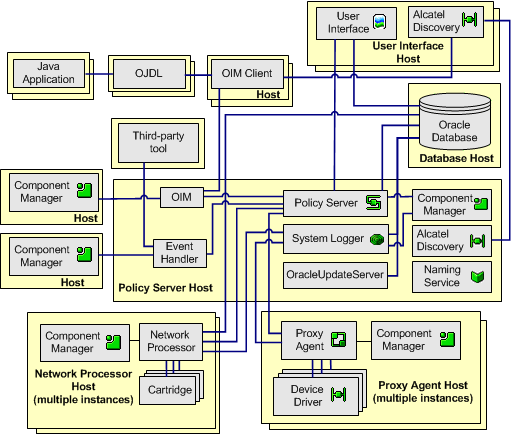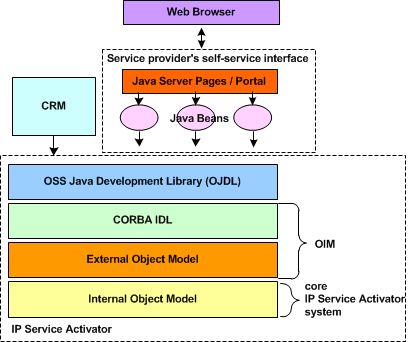| Oracle® Communications IP Service Activator OSS Java Development Library Guide Release 7.2 E47731-01 |
|
|
PDF · Mobi · ePub |
| Oracle® Communications IP Service Activator OSS Java Development Library Guide Release 7.2 E47731-01 |
|
|
PDF · Mobi · ePub |
This chapter provides a brief introduction to the OSS Java Development Library (OJDL), the components of the package, and its relationship to the rest of the Oracle Communications IP Service Activator system.
The OJDL is a generic Java API for IP Service Activator, which allows Java developers to develop or customize interfaces, including web-based or intranet-based user interfaces.
The OJDL package comprises:
Java Classes
Java code samples
The OJDL can be used to develop Java-based interfaces used to integrate IP Service Activator with components of your environment. These could include, for example, your internal Operational Support System (OSS) environment or an external Customer Network Management solution.
Figure 1-1 shows the relationship between the OJDL and the rest of the IP Service Activator system:
Figure 1-1 OJDL in the IP Service Activator System

The OJDL uses the OSS Integration Manager (OIM) interface and provides access to the External Object Model (EOM), a simplified version of IP Service Activator's internal object model used by the OIM API. The OJDL is OSS compliant.
In effect, the OJDL provides additional layers that are built on top of OIM, which in turn sits on top of the core IP Service Activator system, as shown in Figure 1-2.
Figure 1-2 OJDL in the IP Service Activator Architecture Layers

The EOM is a subset of IP Service Activator's internal object model. It defines all the objects that can be accessed or updated by external applications, including their attributes and the relationships between them. The EOM allows users and user programs to create and access data objects without requiring knowledge of the underlying complexity of the entire object model.
The OJDL Java Classes provide access to the objects in the EOM. The OJDL provides the same functionality as the OIM CLI, allowing you to create objects, get and set attributes, search for objects, manage transactions, and report errors.
There are no restrictions on where to install the OJDL directory on the host system.
The prerequisites for using the OJDL are:
Your IP Service Activator installation must include an instance of the OIM. For more information, see IP Service Activator Installation Guide.
If you are developing Java code or running web-based applications, a suitable Java development environment must be installed, such as the Java Platform, Standard Edition (Java SE). For more information, see "Java Development Environment".
The OJDL package is not installed as part of the IP Service Activator standard installation. It is a separate package downloadable from the Oracle software delivery Web site.
To install the OJDL:
Log in to the Oracle software delivery Web site and select Product Downloads. Select Oracle Communications IP Service Activator, then the Components folder for the desired release.
Download the ojdlpackage-rel#.build#.zip file available at the following path on the Oracle software delivery Web site:
Oracle Communications IP Service Activator Media Pack -> Oracle Communications IP Service Activator Software for Solaris
Move the file to the desired directory on the host where you are installing OJDL. There are no restrictions on which directory path you choose.
Unzip the file to create the OJDL directory. The name of the OJDL directory is denoted as ojdlpackage-rel#.build#.
The OJDL directory consists of the following subdirectories:
doc: contains the Java documentation (JavaDocs)
lib: contains the OJDL jar file that contains the java classes
samples: contains code samples for testing purposes